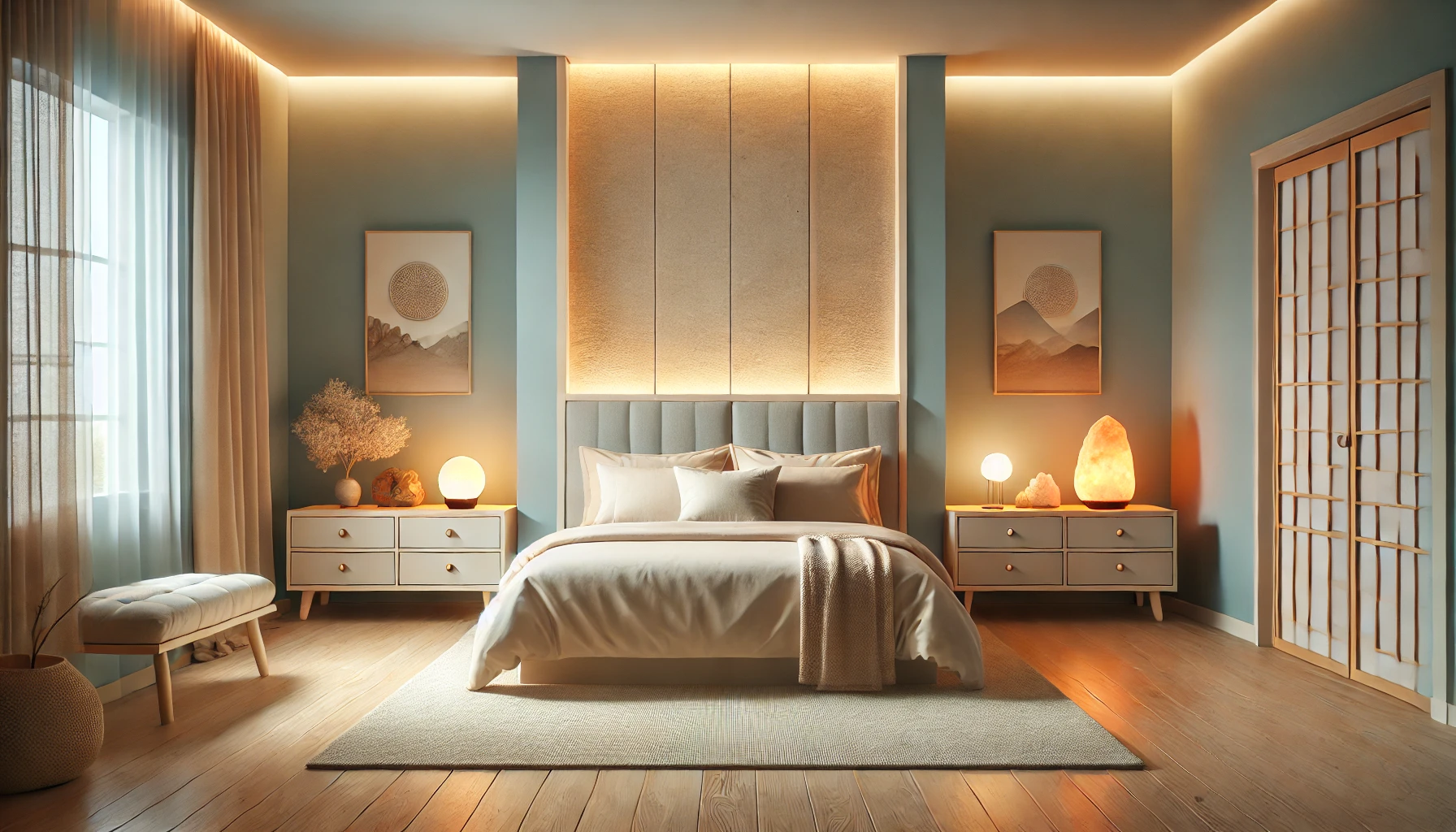How to Use Feng Shui to Improve Sleep and Restore Energy
A good night’s sleep is essential for overall well-being, and Feng Shui offers effective ways to create a restful bedroom environment. By optimizing energy flow, reducing disturbances, and using calming elements, you can enhance sleep quality, restore energy, and wake up feeling refreshed.
1. Position the Bed for Maximum Restfulness
The placement of your bed affects the flow of energy in your room and directly impacts sleep quality.
- Place the bed in the command position—against a solid wall with a clear view of the door but not directly in line with it
- Avoid positioning the bed under a window, as it weakens energy stability
- Do not place the bed directly across from the door, which can lead to restless sleep
- If space is limited, use a room divider or curtain to block direct alignment with the door
2. Choose a Supportive Headboard for Stability
A strong and solid headboard provides emotional and energetic support.
- Opt for wooden or upholstered headboards, as they create a sense of security
- Avoid metal headboards, as they can disrupt energy flow
- Ensure the headboard is firmly attached to the bed for stability
3. Use Calming Colors to Promote Relaxation
The right color scheme influences emotions and helps create a peaceful sleep environment.
- Soft blues and greens – Encourage calmness and deep relaxation
- Light beige and warm earth tones – Provide grounding and stability
- Soft pink and lavender – Support emotional balance and stress relief
- Avoid bright reds, oranges, and dark black, as they can be too stimulating
4. Keep the Bedroom Clutter-Free
Clutter creates stagnant energy, leading to mental restlessness and poor sleep.
- Keep nightstands clean and free of excessive items
- Store clothing and personal items in closets or drawers to maintain order
- Avoid keeping books, work materials, or electronics near the bed
- Do not store items under the bed, as they can create subconscious stress
5. Remove Electronics and Minimize EMFs
Electromagnetic fields (EMFs) from electronics disrupt sleep and energy balance.
- Keep phones, tablets, and laptops out of the bedroom or in airplane mode at night
- Avoid placing a TV in the bedroom, as it creates excessive Yang energy
- Use battery-operated alarm clocks instead of digital ones near the bed
6. Use Soft Lighting for a Relaxing Atmosphere
Lighting plays a key role in signaling the body to relax and unwind.
- Use warm, soft lighting from bedside lamps or dimmable bulbs
- Avoid harsh overhead lights before bedtime
- Consider using Himalayan salt lamps or candles for a soothing glow
7. Balance the Five Elements for Harmonious Energy
A balanced bedroom incorporates all five Feng Shui elements to create harmony.
- Wood (growth & vitality) – Introduce wooden furniture or plants
- Fire (warmth & passion) – Use soft candles or warm lighting
- Earth (stability & support) – Add ceramic decor or earthy colors
- Metal (clarity & calmness) – Use white, gray, or metallic accents
- Water (relaxation & flow) – Add blue tones or calming imagery of water
8. Position Mirrors Wisely to Avoid Sleep Disruptions
Mirrors can reflect energy and create restlessness if not placed correctly.
- Avoid placing a mirror directly facing the bed, as it can cause disrupted sleep
- If a mirror is necessary, cover it at night with a cloth
- Position mirrors to reflect natural light instead of the bed
9. Incorporate Relaxing Scents for Better Sleep
Aromatherapy can help calm the nervous system and improve sleep quality.
- Use lavender essential oil to promote deep relaxation
- Diffuse chamomile or sandalwood for a calming atmosphere
- Avoid overly strong or artificial scents that may overstimulate the senses
10. Use Bedding and Fabrics That Promote Comfort
Soft and breathable fabrics enhance sleep comfort and relaxation.
- Choose natural cotton or linen bedding for breathability
- Use weighted blankets or soft duvets for a sense of security
- Avoid overly bright or heavily patterned bedding, which can be visually distracting
11. Keep the Bedroom a Work-Free Zone
Separating work and rest areas helps maintain a peaceful sleep environment.
- Avoid working from bed, as it creates mental associations with stress
- If you must work in the bedroom, use a desk positioned away from the bed
- Store laptops and work materials in a cabinet or drawer when not in use
12. Create a Pre-Sleep Feng Shui Routine
Developing bedtime habits that align with Feng Shui principles can improve sleep quality.
- Dim lights an hour before bed to signal the body to wind down
- Practice deep breathing or meditation before sleep
- Drink a warm, caffeine-free tea to relax the nervous system
- Keep a gratitude journal to shift energy to a positive state before rest
Final Thoughts: Designing a Feng Shui Bedroom for Better Sleep
By applying Feng Shui principles to your bedroom, you can create a restful environment that supports deep sleep and energy restoration. A clutter-free, well-balanced space with calming colors, natural elements, and minimal distractions promotes relaxation and overall well-being.
Small, intentional changes—such as adjusting the bed position, using soft lighting, and removing electronics—can make a significant difference in sleep quality and energy levels.
